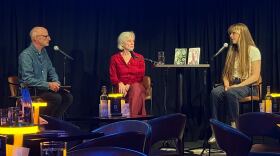Perhaps you’ve had the idea for a novel or memoir floating around in your head for years. Maybe your first draft is already finished! Now, it’s time for the most intimidating part - pitching your idea to an agent or publisher. In anticipation of our book show, we asked listeners to submit their 150-word book pitches and in turn, we sent them to Michelle Brower, a literary agent with Zachary Shuster Harmsworth. You’ll find her favorite three submissions below, but first read Michelle's insider tips.
Do's: How To Catch An Agent's Eye
“To me what makes a pitch wonderful is it’s both somewhat familiar, I can see where it would fit in the market place, I can imagine who the reader might be, but also different. Something that’s a concept that I haven’t really heard before, that feels fresh and offers a new take on something.”
“I always encourage people who are pitching to include books for reference that they think their book is somewhat akin to. The way I like to frame that, is if your book was on a reader’s shelf , what are the other books that are sitting next to it?”
“I always like to see a pitch in this generalized structure that really matches the back of a book copy. It starts out with a premise…then there’s some sort of inciting incident or conflict…and then it points us to a path of resolution.”
Don'ts: Common Mistakes Of Aspiring Writers
“Really not knowing the market; having a book that’s far too long; having a book that’s far too short; having a book that is supposed to be a crime novel but doesn’t have that suspense element in it.”
“Telegraphing success far too much and far too quickly…You know, 'you need to publish this book, this book will be bigger than Harry Potter.' That sort of thing.”
“I really like to see someone who is secure in their story, and that means they don’t need to pump it up with laudatory adjectives. I want to get from the pitch that this is a person that I would really like to work with for a long time.”
Off The Slush Pile: Three Successful Pitches
We received over 40 book pitches, and Michelle carefully combed through them all and selected her three favorites. Below are the original pitches and Michelle's response to each.
Pitch 1: Untitled
Mountain View Community Acres was exactly the type of assisted living facility that manager Katie Harwick felt was the right place to pull her life back together. The peaceful rural setting and small town atmosphere were ideal, and it should have been a short-term job—the property is to be sold to a developer once the last resident has passed away.
Thirteen residents now remain, all of whom have passed the centenarian mark. As the average age rises, so do tensions. Relatives with mounting financial pressures, the media obsessed with an intriguing story, and religious pilgrims who believe the residents’ longevity is a modern-day miracle all turn the quiet facility upside-down.
Each of the remaining residents has a story, and it falls on Harwick and an overworked case worker to listen to their tales and unravel the mystery of what is binding these souls to earth.
Pitch 2: Secrets of Flight
Kerry is an intern at a nature center on a remote New England island when she meets Noah, a divorced man with a young daughter. Kerry and Noah fall in love, marry, and have a son, Robin, but their marriage runs into trouble when Rob proves to have problems with social interaction and an obsession with classifying birds. Before long, birds are appearing everywhere: flying into windows, perching on Kerry’s hat, landing injured on her front doorstep.
Then Kerry stumbles upon a 100-year-old book about augury, the ancient art of predicting the future based on the patterns of birds in flight.
When she discovers Noah is having an affair, Kerry takes Rob and the mysterious bird book and flees to the island where it all began. Surrounded by artists and eccentrics, she must divine the direction of her own life and foresee where her family’s future lies.
Pitch 3: The Cat Who Loved the Moon
As Cromwell the calico cat goes about his daily life, he realizes that he's very similar to the moon. Not only does he have the same shapes as the moon, but the moon seems to be everywhere he is. Cromwell decides that he loves the moon very much.
But one day, the moon goes away.
What follows is a simple and bittersweet realization that touches on loss and change in a manner that will resonate with both children and the adults in their lives.
This non-rhyming children's picture book uses a rhythmic pattern that educates about shapes and similarities on a very basic level while also conveying that comfort can be obtained even in the face of change.







